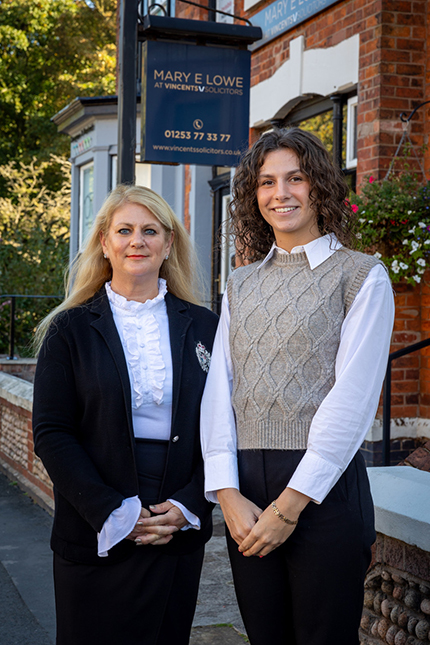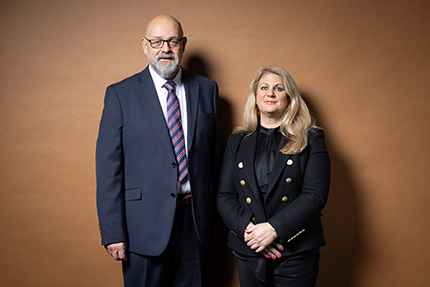Home > News
02/06/2025
Blackpool Race for Life
Cancer Research
Poulton
1 min read
Vincents’ Poulton team sets £1,000 Cancer Research target
29/05/2025
Child Care Law
Chorley
Commercial Property
Company and Commercial
Court of Protection
Employment Law
Events
Family Law
Garstang
High Net Worth Divorce
Insights
Lytham
Medical Negligence
News
Penwortham
Poulton
Preston
Private Client
residential conveyancing
Uncategorised
2 min read
Derian House Colour Run Sponsorship
13/05/2025
Penwortham
Private Client
Solicitors in Penswortham
wills and Probate Solicitors
3 min read
New wills and probate team at Vincents Penwortham
07/05/2025
Child Care Law
Child Care Law
Custody Arrangements
Family Law
Family Law
Preston
Protecting your child from conflict
Seperating Parents Advice
3 min read
How can separating parents best protect their children?
07/05/2025
A Godparent is not a Guardian
Half UK Parents have not appointed guardians
Lytham
Make a Will
Private Client
4 min read
A Godparent is not a Guardian
06/05/2025
Company and Commercial
Preston
1 min read
Companies House Identity Verification Changes
01/04/2025
Court of Protection
Garstang
Private Client
2 min read
New Court of Protection Team
17/02/2025
Family Law
Insights
Preston
5 min read
Media access to your divorce hearing, what you need to know
10/02/2025
Commercial Property
Family Law
News
Poulton
Preston
2 min read
Double delight for Vincents two newest solicitors
10/02/2025
Becoming a lawyer
Commercial Property
Insights
Poulton
2 min read
From the Big Top to the Law Firm
31/01/2025
Company and Commercial
Limitation periods
Preston
2 min read
What are the time limits for bringing a legal claim?
23/01/2025
Lytham
Private Client
Writing your will
Your Will and Pets
4 min read
What happens to my pet when I die?
23/01/2025
Lytham
Private Client
What is a Personal Representative
Wills and Probate Advice
2 min read
Statutory Notices
22/01/2025
Company and Commercial
Company and Commercial
Preston
Thatchers Cider vs Aldi
Trade Mark Advice
2 min read
Thatchers Cider vs Aldi
22/01/2025
Gynae Compensation Claims
Gynaecological Compensation Claims
Medical Negligence
Medical Negligence Advice
Medical Negligence Claims
Medical Negligence Claims Solicitors
Medical Negligence Solicitors
Preston
4 min read
NHS Gynae Delays
10/01/2025
Company and Commercial
Insights
Preston
1 min read
Privacy Policy for your Website
02/01/2025
Break Clauses and Commercial Leases
Commercial Property
Commercial Property
Commercial Property Lease Advice
Poulton
2 min read
Break Clauses
20/12/2024
High Net Worth Divorce
High Net Worth Divorce
Lytham
News
2 min read
Specialist HNW legal office triples in size
20/12/2024
Commercial Property
Company and Commercial
News
Poulton
Private Client
residential conveyancing
1 min read
Poulton new office opening party
17/12/2024
Commercial Property
Commercial Property
Poulton
Vincents Solicitors
2 min read
New Poulton office for Vincents Solicitors
03/12/2024
Commercial Law
Company and Commercial
Insights
Preston
Professional Sports Contract
1 min read
Top 6 essential points to include in your professional sports contract
03/12/2024
Commercial Property
Commercial Property
Insights
Leasehold Break Clauses
Leasehold Properties
Poulton
3 min read
Understanding Break Clauses in Property Leases
28/11/2024
Budget 2024
Lytham
Private Client
Uncategorised
3 min read
Budget 2024: Changes to Inheritance Tax
26/11/2024
Company and Commercial
Insights
Preston
4 min read
Budget 2024: Impact on Small Businesses
20/11/2024
Company and Commercial
Employment Law
employment law advice
employment law solicitor
Insights
New rules on redundancy and pregnancy
pregnancy and employment law
Preston
3 min read
Redundancy and pregnancy
31/10/2024
Buy to Let
Chorley
Landlord Advice
News
Penwortham
Poulton
Preston
residential conveyancing
Stamp Duty Increase
UK Budget
2 min read
Immediate Stamp Duty Increase
28/10/2024
News
Penwortham
Penwortham Community Business Network
Vincents Solicitors Penwortham
2 min read
Penwortham Cemetary Clean Up
25/10/2024
Commercial Law
Company and Commercial
Music Contract Advice
Music Contract Law
Preston
2 min read
Top 6 Elements in a Music Contract
22/07/2024
Divorce Law
Family Law
Full and Frank Disclosure
High Net Worth Divorce
Insights
Preston
2 min read
Dishonest disclosure punished in Divorce Proceedings
22/07/2024
Commercial Property
Commercial Property
Commercial Property Lease Advice
Insights
pop up shops
Poulton
short term lease
4 min read
Top 5 tips for landlords and tenants about Pop up Shops
18/07/2024
Apple vs Samsung
Company and Commercial
News
Patent Advice
Patent Breach
Trademark Advice
Tradmark Breach
4 min read
Apple vs Samsung Patent Wars
18/07/2024
Chorley
Insights
residential conveyancing
1 min read
6 Things You Need to Know about Conveyancing Law
17/07/2024
1954 Landlord and Tenant Act
Commercial Property
Commercial Property
Contracting Out
Insights
Poulton
3 min read
Contracting out, what you need to know
10/07/2024
Family Law
Insights
Lytham
Preston
3 min read
Deluge of divorce cases expected this spring
10/07/2024
Divorce Advice
Divorce Rates in UK
Divorce Solicitor
Family Law
Family Law
High Net Worth Divorce
Insights
News
3 min read
New No Fault Divorce – the changes explained
10/07/2024
Insights
Law jobs
News
Trainee Solicitor jobs
Training contract
2 min read
Top trio win training contracts with Vincents
10/07/2024
Big Mac Vs Supermacs
Company and Commercial
Insights
News
Trademark
2 min read
The Big Mac of legal battles
03/07/2024
Divorce
Divorce Advice
Divorce Law
Divorce Rates in UK
Divorce Solicitor
Family Law
Family Law
Insights
4 min read
I’m a divorce lawyer and here’s why divorces are down 30%
28/05/2024
Commercial Property
Commercial Property Lease Advice
Insights
New Lease
Preston
Tenants and Lease
2 min read
Top tips for tenants taking new leases
13/05/2024
Cash Gifts
Cash Gifts to Family and Friends
Inheritance Tax Liabilities
Insights
Lytham
Private Client
Wedding Gifts
3 min read
Wedding gifts and Cash Limits
25/03/2024
Company and Commercial
Lidl wins Appeal against Tesco in trademarking row
News
Preston
Tesco vs Lidl Trademarking row
4 min read
Lidl v Tesco trademark row
18/03/2024
Court of Protection
Garstang
Insights
News
Private Client
3 min read
Welfare Benefits Check Service
12/03/2024
Chorley
News
Vincents Solicitors Chorley
Vincents Solicitors new office in Chorley
2 min read
Vincents Solicitors moves to new office in Chorley
11/03/2024
Court of Protection
Garstang
News
Private Client
Welfare Benefits Service
4 min read
Expansion for Vincents’ Court of Protection team
29/02/2024
Insights
Medical Negligence
Medical Negligence Advice
Medical Negligence Claims
Medical Negligence Claims Solicitors
Medical Negligence Solicitors
Preston
1 min read
Seeking Justice: Medical Negligence Claims
17/01/2024
Chorley
Garstang
Insights
Lytham
Penwortham
Poulton
Private Client
Trusts Solicitors
wills and Probate Solicitors
4 min read
What is an attorney, an executor, a trustee?
17/01/2024
Garstang
News
Private Client
2 min read
Vincents Solicitors raises vital funds for charity
13/12/2023
Coercive Control
Domestic Violence
Family Law
News
Preston
2 min read
Domestic violence specialist joins Vincents
20/11/2023
Garstang
News
Private Client
4 min read
New Head of Court of Protection and Trusts
14/11/2023
Business sale
Commercial Law
Company and Commercial
Company Law
Insights
Preston
2 min read
Getting your business ready for sale and exit
07/11/2023
Garstang
Insights
Lytham
New Intestacy rules
Private Client
write a will to protect your partner
2 min read
Write a Will, Protect your partner
07/11/2023
Company and Commercial
News
Preston
3 min read
Vincents Solicitors welcomes former CPS trainee
07/11/2023
Insights
Lytham
Preston
Private Client
3 min read
Protect your assets for your children’s future
07/11/2023
Insights
Lytham
Private Client
Trusts Advice
Trusts Solicitors
Wills
wills and Probate Solicitors
6 min read
Gifting the Family Home v Establishing a Property Trust
31/10/2023
Commercial Property
Company and Commercial
Lytham
News
Preston
4 min read
Vincents Solicitors advises developer Walker & Williams
18/05/2023
Chorley
Leasehold Properties
New Build Properties
News
Penwortham
2 min read





















































































































